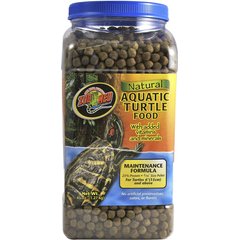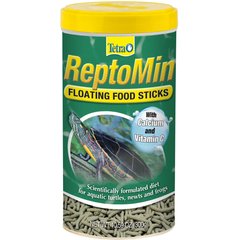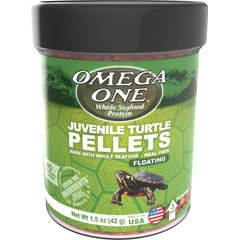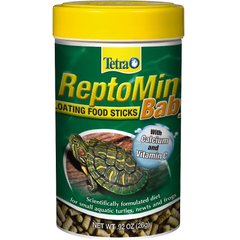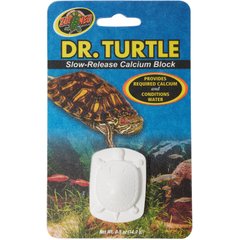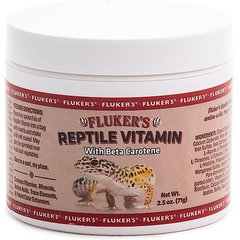What Do Turtles Eat? A Guide To Feeding Your Pet Turtle
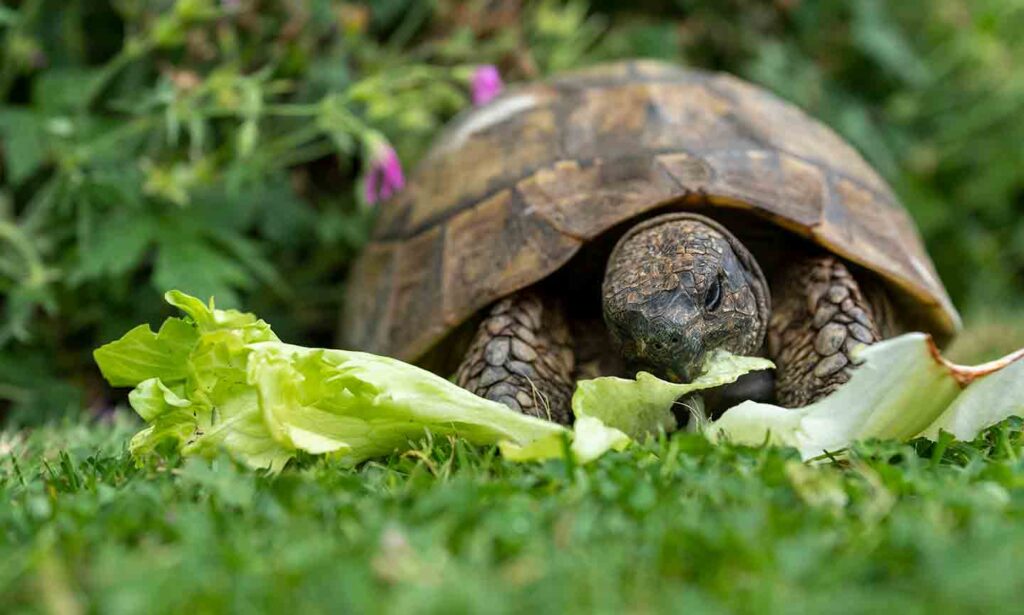
Photo by Alphotographic/iStock/Getty Images Plus
Turtles may be small, but they’re a big responsibility when it comes to their care—especially feeding them. You want to feed them healthy foods that’ll maximize their lifespan. However, no diet is one-size-fits-all. A turtle’s diet will depend on their species, as some may be vegetarians and others meat-eaters, with most somewhere in between.
We spoke with a veterinary expert on what turtles should and shouldn’t eat, their dietary needs, what to look for in turtle pellets, and more.
What Do Turtles Eat?
Most turtles are omnivores, meaning they eat a combination of plant- and animal-based foods, including commercial pellets. Their diet varies depending on their species—aquatic turtles eat different things from tortoises or box turtles, for instance. Dr. Doug Mader, MSc, DVM, a triple board-certified veterinary specialist in Big Pine, Florida, says it’s crucial to feed them appropriately to ensure proper nutrition for their species.
The diet of a fully grown, omnivorous, semi-aquatic turtle, such as the snapping turtle, should consist of:
- Plant material: More than 50 percent
- Commercial pellets: About 25 percent
- Live food: About 25 percent
If there’s any pet who’s mastered the art of adding color to their plate with healthy foods, it’s the turtle. Common foods to feed turtles include:
- Vegetables
- Live food
- Fruits
- Plants
- Flowers
What Vegetables Can Turtles Eat?
Turtles love their veggies! Dr. Mader, who wrote “The Vet at Noah’s Ark,” says that, as a general rule, it’s best to feed dark, leafy greens since they have the most vitamins and minerals in them.
Examples of vegetables that turtles can eat include:
- Mustard greens
- Collard greens
- Radish
- Beet greens (sparingly)
- Turnip greens
- Kale
- Dandelion leaves
- Carrot tops (sparingly)
- Cucumbers
What Live Food Can Turtles Eat?
While pet box turtles will eat some live food, Dr. Mader says you’ll see more live food included in the diets of pet aquatic turtles.
Some live food pet aquatic turtles can eat include:
- Earthworms
- Small slugs
- Waxworms
- Crickets
- Snails
- Small feeder fish
Pet box turtles can eat the following live food:
- Grubs
- Mealworms
- Crickets
When feeding any live food, Dr. Mader says to be mindful of the risk of transmitting parasites.
What Fruits Can Turtles Eat?
While aquatic turtles may not be too keen on fruits, Dr. Mader says box turtles and tortoises will eat them.
He mentions that turtles and tortoises will eat nearly any fruit, with some favorites including:
- Strawberries
- Raspberries
- Blackberries
To help keep their beak trim, you can give them cantaloupe with the rind still on.
“[Turtles] like color; they see color really well,” Dr. Mader says. “If you have a turtle, a box turtle, or a tortoise that’s not eating well, oftentimes, if you feed them something bright red, like a strawberry, it stimulates their appetite.”
However, because fruit contains sugar and water and isn’t particularly nutritious for turtles to eat, he recommends giving it only as a treat, making up no more than 10–15 percent of the total volume of their diet.
Pellets are essential to feeding your turtle a balanced diet. With so many options of turtle food available for pet parents to choose from, Dr. Mader recommends selecting high-quality pellets from a trusted brand. These will offer complete nutrition for your turtle to stay healthy as a juvenile or adult.
Recommended Products
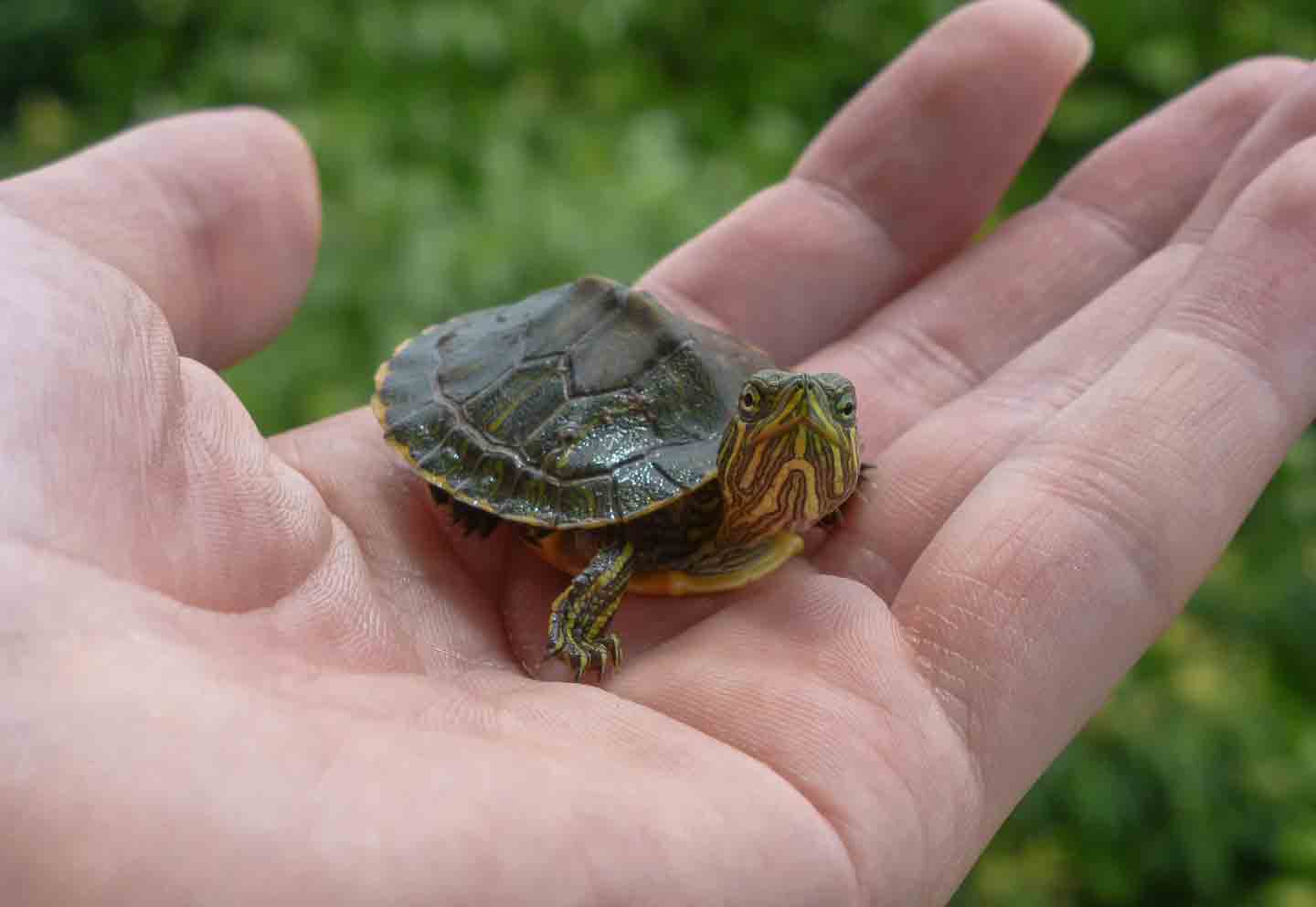
Pablo Solís Fernández/iStock/Getty Images Plus
What Do Baby Turtles Eat?
Baby turtles can eat the same foods as adult turtles, Dr. Mader says. The only difference is that, like all young animals that are in the phase of growing, they’re typically going to need more protein, vitamins and minerals.
You can ensure your hatchling or young turtle is getting adequate nutrition by choosing a life stage–appropriate pellet and feeding them more frequently (i.e., daily instead of about three times a week).
Recommended Products
Pet Turtles’ Dietary Needs
Many species of pet turtles are omnivores, while some are carnivores and others are herbivores.
Omnivores
An omnivorous diet consists of both plant material and animal matter.
Common types of turtles that are omnivores include:
- Red-eared sliders
- Box turtles
- Painted turtles
Dr. Mader says turtles who are omnivores will typically eat foods such as:
- Dark, leafy greens and other vegetables
- Insect/animal protein (e.g., earthworms, crickets, snails, crustaceans such as shrimp, or small fish)
- Plants and aquatic plants
- Algae and plankton
- Fruits
Carnivores
A carnivorous diet consists of primarily animal-based food sources.
Dr. Mader says some aquatic turtles are mainly carnivorous, such as the softshell turtle. Foods that make up their diet generally include fish and insects.
Herbivores
An herbivorous diet is made up of only plant materials.
Dr. Mader says all tortoises, or land turtles, are primarily herbivores. They mostly eat foods like:
- Leafy greens and other vegetables
- Grasses
- Plants
- Flowers
- Fruits
How Much To Feed Your Turtle
In general, the approximate amount of food any turtle should eat daily is about 3 percent of their body weight, Dr. Mader says. For example: If you have a 100-gram turtle, you’ll feed them 3 grams.
It’s always best to consult a vet to learn more about how much your turtle should eat daily based on their individual needs.
How Often To Feed Your Turtle
There are over 300 species of turtle, and every type will have different needs, Dr. Mader says. However, for the 10–15 common types of pet turtles, he recommends feeding adult turtles up to three to four times a week. This is to prevent unwanted weight gain, as obesity is a common problem for turtles, he says.
For juvenile turtles, it’s advised to feed small amounts every day. Again, your veterinarian is your best resource when it comes to understanding how often your particular turtle needs to be fed.
Do Turtles Need Vitamins or Supplements?
Vitamins or supplements aren’t necessary for pet turtles if they’re eating a high-quality pellet that’s appropriate for their life stage, Dr. Mader says. Pellets are packed with the nutrients turtles and tortoises require for overall health, no matter whether they’re young and developing or fully grown adults.
However, if you’re feeding a homemade diet, Dr. Mader says he’d recommend giving your turtle a balanced, complete vitamin supplement that includes calcium.
It’s important to note that too many vitamins (i.e., giving a high-quality pellet and a supplement) can be toxic—and even fatal—to turtles, Dr. Mader says. It’s always best to consult your vet before introducing any new foods or supplements into your turtle’s diet to learn if they’re suitable options based on your pet’s individual needs.
Recommended Products
What Shouldn’t Turtles Eat?
While there are plenty of foods turtles can eat, some foods can pose a risk of being poisonous or are harmful to turtles in general.
Turtles should avoid the following:
- Toxic houseplants, such as azaleas, hydrangeas and poinsettias
- Tomato leaves and vines
- Avocado (leaves and seeds)
- Broccoli, cabbage, spinach and cauliflower (for tortoises)
- Artificial plants
- Oak (leaves, sprouts and acorns)
- Wild-caught animals (due to the risk of parasites)
Before feeding your turtle any vegetables or fruit, be sure to thoroughly wash and rinse the produce to reduce the risk of pesticides. If you have concerns about systemic pesticides, Dr. Mader recommends buying your turtle’s produce from an organic grocer.
FAQs About Feeding Pet Turtles
What do green turtles eat?
Green turtles, also known as green sea turtles, eat a mostly plant-based diet consisting of seagrass and algae.
What is a tortoise’s favorite food?
Many tortoises are “browsers,” Dr. Mader says. They enjoy eating grass, plants, leaves and whatever else they can reach. If given the choice, they’ll eat fruits and veggies—they love the taste!
What do box turtles eat as a pet?
Box turtles will eat everything from vegetables, fruits and pellets to bugs and worms. Dr. Mader recommends feeding a pelleted diet to best support their nutritional needs.
What types of food are safe for aquatic turtles?
Aquatic turtles can safely eat a variety of leafy greens, fish, invertebrates, aquatic plants and some fruits.
You’re bound to strengthen your bond with your pet turtle by offering them a variety of foods they can’t get enough of! If you have or are looking to adopt a pet turtle, check out our guide on proper aquatic turtle care, and find out how to set up their tank.
Expert input provided by Dr. Doug Mader, MSc, DVM, a triple board-certified veterinary specialist and author of “The Vet at Noah’s Ark” in Big Pine, Florida.
This content was medically reviewed by Chewy vets.
